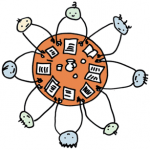Teamwork and Doctors
05 December 2013
Why are ineffectual teams so common?
 I hear clients talk about their poorly performing teams and the stress this causes frequently. People assume that as adults, teamwork should come naturally, especially in the health service where everyone has the same goal. However, finding a role in your team, contributing positively and leading democratically do not come easily. More typically, the group dynamics are poor, there is conflict around decision-making, low levels of trust or the leadership is weak. This affects everything and it's really difficult to move the team to a better position.
It can be more straightforward in clinical teams where there is a hierarchy and focus that enable people to understand the shared purpose. However put Doctors into managerial teams, research teams, projects teams, educational teams, peers groups etc, then the dynamics can be very different, much harder to navigate and can be constantly shifting.
I think the reason that ineffectual teams are so common is because people assume teams can take care of themselves or it's someone else's responsibility. They can't and it isn't. It takes planning and action by all to make them work well. Here are some tips to think about if you are considering starting a new team or reflecting on a poorly functioning team.
Starting a new team:
I hear clients talk about their poorly performing teams and the stress this causes frequently. People assume that as adults, teamwork should come naturally, especially in the health service where everyone has the same goal. However, finding a role in your team, contributing positively and leading democratically do not come easily. More typically, the group dynamics are poor, there is conflict around decision-making, low levels of trust or the leadership is weak. This affects everything and it's really difficult to move the team to a better position.
It can be more straightforward in clinical teams where there is a hierarchy and focus that enable people to understand the shared purpose. However put Doctors into managerial teams, research teams, projects teams, educational teams, peers groups etc, then the dynamics can be very different, much harder to navigate and can be constantly shifting.
I think the reason that ineffectual teams are so common is because people assume teams can take care of themselves or it's someone else's responsibility. They can't and it isn't. It takes planning and action by all to make them work well. Here are some tips to think about if you are considering starting a new team or reflecting on a poorly functioning team.
Starting a new team:
- Be clear about the purpose of the team and what its' objectives are.
- Be clear about the roles that you expect people to play in the team.
- Be clear about your shared values for being a part of this team.
- Be clear about how you will work, meet and get things done.
- Draw a map of the team to get a birds-eye view of all the members and their positions. What does this tell you?
- In order to build trust, practice empathising with other members and get to know them a bit better.
- Accept that conflict is a part of any team and develop a strategy to manage the conflict safely.
- Acknowledge that everyone has an equal role to play and should be heard.
